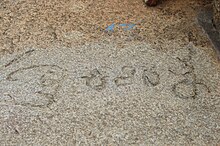Ranna
| Ranna | |
|---|---|
| Born | 10th century Mudhol |
| Died | 11th century |
| Occupation | Poet, Writer |
| Works | Saahasabhima Vijaya (magnum opus) |
| Ranna ರನ್ನ | |
|---|---|

Inscrbed handwriting (in Kannada characters) of Ranna reads Kavi Ratna ("gem among poets") at Shravanabelagola
|
Ranna (Kannada: ರನ್ನ) was one of the earliest and arguably one of the greatest poets of the Kannada language. His style of writing is often compared to that of Adikavi Pampa who wrote in the early 10th century. Together, Ranna, Adikavi Pampa and Sri Ponna are called "three gems of ancient Kannada literature".
Ranna was a 10th century Kannada poet. He was born in 949 C.E. in ancient Muduvolal, known now as Mudhol in the Bagalkot district of the modern Karnataka state in India, to a family of bangle sellers.
During his early days as a writer, Ranna may have been patronised by Chavundaraya (or Chavundaraya), the famous minister of the Western Ganga Dynasty. With the rise of the imperial Western Chalukya Empire, Ranna became an important poet in the court of King Tailapa II and his successor King Satyashraya who bestowed upon him the title Kavi Chakravarti (lit, "Emperor among poets").
The writings of Ranna are in Halegannada (lit, "old Kannada"). Of the five known major works accomplished by him, two are available in full and one in part. They are: Ajitha purana, Parashuramacharithe (extinct), Saahasabhima Vijaya (also known as Gadaayuddha), Ranna Kanda and Chakresvaracharite (extinct).
Ajitha Purana (993 C.E.) is a Jain champu (a form of composition) purana written in twelve sections on the life of Ajithanatha, the second Tirthankar. Ranna wrote this purana under the patronage of a Jain lady called Attimabbe, the wife of general Nagavarma.Ranna Kanda (990 C.E.), so called because it is written in the Kanda meter, is the earliest extant lexicon in the Kannada language. Only twelve sections of this writing are available.Parusharama Charite (around 980 C.E.) is a eulogy of the Ganga minister and commander Chamundaraya. The poet held his patron in such high esteem that he claims to have named his son "raya" in honor of his patron (who had the honorific Samara Parashurama).
...
Wikipedia
